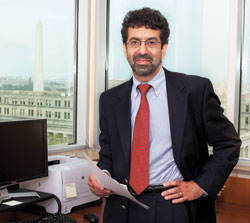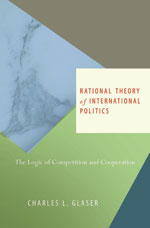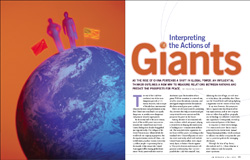Interpreting the Actions of Giants
As the rise of China portends a shift in global power, An Influential Thinker outlines a new way to measure relations between nations and predict the prospects for peace.
The end of the Cold War concluded one of the most dangerous periods in U.S. history. But now, only a couple of decades later, international relations theorists and policymakers worry that China's rise could lead to an equally dangerous, or possibly more dangerous, competition between superpowers.
In the second half of the 20th century, much of the world's power was concentrated in the United States and Soviet Union, fueling their decades-long global and regional rivalry. The collapse of the Soviet Union in 1991 effectively left the world with one reigning superpower. But the rapid economic ascent of China—the world's most populous country, with some 1.3 billion people—is promising that by the middle of this century the United States again will be sharing global dominance. World power will once more be distributed upon the shoulders of two giants. Will the transition be a smooth one, or will it create the military, economic, and ideological competition that has traditionally characterized great-power politics?
There are of course tools for predicting this, theories that help us understand past competition between nations and the prospects for peace in the future.
Among theories of international relations, realism—which sees power playing a central role in shaping the interactions of leading states—remains most influential. The standard realist arguments do not bode well for peace. According to this standard view, China will pursue its interests more assertively, which will lead the United States and its allies, most importantly Japan, to balance harder against it. This cycle of action and reaction will generate a relationship that—at best—parallels the Cold War standoff. And, following this line of logic, we will need to worry about the possibility that China and the United States will end up fighting a hegemonic war for control of East Asia.
In my view, however, this perspective fails to capture some key features of the way states interact, such as how cooperation can reduce fear, and how geography and technology can influence a state's military capabilities. Consequently, we end up with a distorted picture of the future.
In response to these shortcomings, I've constructed a new theory that is presented in my recent book, Rational Theory of International Politics, which attempts to enhance our ability to explain the past and to prescribe policies for managing the future.
Through the lens of my theory, the outlook on U.S.-China relations is more balanced and, fortunately, more optimistic.
The theory begins with a couple basic assumptions that are widely shared by so-called "grand theories of international politics," which examine how states are influenced by the international system.
We assume, first, that the international system is anarchic—which is not to say it is chaotic, only that it lacks an international authority that can enforce agreements and prevent the use of force.
The theory also assumes that states are rational, unitary actors. This clearly is not accurate, but is well matched to the theory's purposes. It allows us to imagine a state as a single operating unit with a well-defined national interest. The rationality assumption enables us to focus on the impact of the international system by envisioning states as consistently considering the implications of their actions. These simplifications enable the theory to analyze efficiently which strategy a state should choose, given the constraints and opportunities presented by the international system.

Charles Glaser, a professor of political science and international affairs, and director of the Institute for Security and Conflict Studies at the Elliott School of International Affairs.
William Atkins
The theory then identifies three types of variables that a state should consider in choosing its international strategy:
1. The state's own motives: Does the state want simply to be secure, protecting the territory it currently controls? Or does it want to expand and revise the status quo?
2. The state's material variables: The most obvious and widely employed material variable is power—the resources that a state can draw upon to build up military forces. The more powerful a state is relative to its adversary, the more capable it is of winning an arms race and, if fully armed, of winning a war.
But considering only power here is a grave mistake. The relative ease of defending a state also must be considered. For instance, separation by great distances—especially by water—makes a state more difficult to attack; so do nuclear weapons, which can provide a state with the ability to retaliate, and thereby effectively deter an adversary even when the adversary is much wealthier and more powerful.
The new theory accounts for this with an offense-defense variable that reflects the relative ease of attacking or defending. When the offense-defense balance favors defense—as it does when states are separated by great distances or possess capable nuclear forces—a less powerful state can effectively defend itself against a more powerful state.
3. The state's information about the motives of its adversary: For simplicity, the theory distinguishes between two types of opposing states—those that are interested only in security and want to protect the status quo, and those that are greedy and want to revise the status quo.
A state will usually be uncertain about the opposing state's type, but this does not mean it knows nothing or that it views all states similarly. For instance, the prospect of a nuclear Iran is much more of a worry for the United States than the well-established nuclear arsenal of Great Britain. The United States is confident that Britain is a security-seeking state, but is worried that Iran might be a revisionist state.
Disagreements about this third variable explain some of the deepest divides in U.S. foreign policy debates. During the Cold War, for example, so-called "hawks" believed the Soviet Union was a highly revisionist state, so they favored competitive U.S. military policies designed to increase the U.S. ability to deter attacks. "Doves," on the other hand, believed the Soviet Union was driven largely by insecurity and that its policies were best understood as reactions to threatening U.S. policies. As a result, they favored cooperative policies intended to reduce Soviet fears.
An emerging debate over China is beginning to acquire a similar pattern, with observers who believe China wants to fully dominate its region calling for more competitive U.S. policies, and others who believe that China is largely content with the status quo advocating for more restrained military and diplomatic policies.
In the best-case scenario then, in which both China and the United States are seeking only enough security to defend themselves and preserve the status quo, is there still cause for concern? Could two security-seeking states end up in armed conflict?
Under my theory the answer is: Yes, potentially. This competition is explained in international relations theory with a concept called the security dilemma. It occurs when the actions a state takes to become more secure reduce the security of a potential adversary. The security dilemma can be particularly severe when a state that's preparing to defend itself appears to act just like a state that is preparing to attack. When attacking would be relatively easy, the effect is compounded.
Information about the motives of an opposing state can factor into the equation. If the opposing state is believed likely to be interested only in protecting its security, then the security dilemma is less severe. Extending cooperative policies to that state, rather than pursuing competitive ones, is less risky because it is more likely to reciprocate cooperation. And in reciprocating cooperation, the state that would otherwise have built up its arms for security can communicate that it is not driven by greedy motives.
Overall then, Rational Theory of International Politics finds that the international system does not, as a general rule, fuel competition between major powers. This stands in stark contrast to the standard realist view, which holds that states will always compete intensely for security. While it is true that under some material and informational conditions competition and even war will be a security-seeker's best strategy, under other conditions states will be able to adopt cooperative strategies and enjoy high levels of security.
The book goes far beyond these central arguments, demonstrating the versatility of the new theory. For example, it considers a variety of types of states, including states that vary in their determination to change the status quo, and examines how changes in power can create additional pressures for competition.
Rational Theory of International Politics employs this theory to analyze and explain important historical cases, including the end of the Cold War and Germany's decision under Adolf Hitler to pursue continental hegemony. It also delves into whether key arms races actually represented the best options available to the states involved. Although usually dangerous and often correlated with war, an arms race could nevertheless be a state's best option because the international environment makes not racing even more dangerous.

Charles Glaser's most recent book, Rational Theory of International Politics, was published by Princeton University Press in 2010.
I conclude, however, that three big arms races in recent history reflected flawed policies: Germany's decision to launch a naval race against Britain at the beginning of the 20th century; Japan's decision to engage the United States in a naval competition starting in the 1930s; and the U.S. decision to intensify the nuclear arms race by building multiple-warhead missiles starting in the 1970s. In the end, these actions reduced the states' security, and available alternatives would have served them better.
In terms of current policy, the book's findings offer new insights into the implications of China's rise. While the standard realist view foresees an intensifying U.S.-China military competition, this need not be the case if we consider the essential material and information variables highlighted by my theory.
Both China and the United States enjoy a large defensive advantage that is created by the expanse of the Pacific Ocean between them, and by the deterrent capabilities offered by nuclear weapons. As a result, both the United States and China will be able to protect their vital interests during and after China's rise.
These benign material conditions, in turn, will make it easier for the United States and China to avoid severely strained political relations. It's helpful, too, that their current political relationship is relatively good.
This is not to say, however, that there are no dangers in the U.S.-China relationship. The most volatile point between them is Taiwan. China places top priority on integrating Taiwan with the mainland and sees U.S. efforts to protect Taiwan as threatening its vital interests. It remains an open question whether the United States can preserve good political relations with China while sticking with its current policy toward Taiwan. If not, the United States will need to consider revising its Taiwan policy.
As China rises, it also will be important for both sides, but especially the United States, not to infer too much from the actions of the other. An overreaction to Chinese growth, particularly in the scale of its military, could all-too-easily spark a chain reaction that leads both sides to exaggerate their insecurity, which would increase the probability of crises and war.
In other words, as the global balance of power continues to shift, the prospects for peace between the United States and China are quite good. The key is for leaders of both states to keep a close watch and a cool head.

